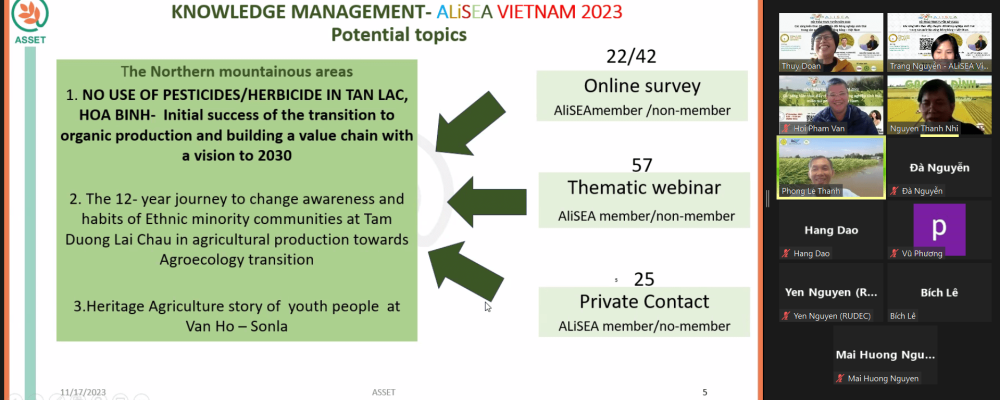On November 17, 2023, The Agroecology Learning Alliance in Southeast Asia (ALiSEA) organized an online workshop entitled initiatives to Accelerate Agroecology transition in the in the Rice production – Delta Areas of Viet Nam attended by 30 participants from academies, NGOs, government agencies and businesses.
The selected initiatives were presented by the speakers representing various actors involved in AE transition promotion including research institution and companies. The 1st paper was presented by Mr. Le Thanh Phong, Vice director of Climate Change Institute- An Giang University, on the necessary to promote research on flood-resistant rice varieties from rice genetic resources currently stored at institutes and schools. This helps regenerate and improve suitable rice varieties, develop favorable rice cultivation models, and bring profits to farmers without relying too much on chemical fertilizers. “He said: In the context of climate change which is having a major impact on the Mekong Delta region, Floating rice variety ( indigenous rice varieties) can be considered a traditional farming solution capable of adapting to climate change, especially in flood environments; creating diversification in agricultural production, has great potential to bring sustainable income to farmer, especially supporting effective water management in the Mekong Delta region. The planting rice area (floating rice) is considered a space containing the floodwater to help limit blockage of flowing water causes erosion of river and canal banks. Floating-rice season, on the one hand, takes advantage of alluvium in floodwater, reduces the use of agricultural chemicals, and on the other hand, creates ecosystem services to serve as a foundation for restoring natural fisheries.”
The second presentation delivered by Mr. Nguyen Thanh Nhi, CEO of Co.LTD An Dinh Invest and Technology Development, shared the techniques applied in rice farming: Alternating flooding and drying stage (only regulating water into rice fields at certain periods) helps rice have strong roots and save water, reduce the amount of seeds and fertilizers, especially nitrogen (excess nitrogen not fully absorbed by rice is the leading cause of C02 emissions), no burn straw after harvesting and decompose it with microorganisms to return soil fertility. Resulting, reduce the amount of greenhouse gases per rice area. The rice production process has been evaluated to reduce costs; the rice plants are healthy, with few diseases, thereby significantly improving productivity and quality. The replication model has been implemented in communes in Thai Binh province and to other Red River Delta provinces (Hung Yen, Nam Dinh, Hai Duong, Hai Phong, BAC Giang) and reaching the Mekong Delta provinces (An Giang, Kien Giang…). Through efforts to build reputation from quality, An Dinh has enhanced the value of Vietnamese rice products, bringing trust to farmers and truly affirming itself as a trusted brand for consumers. Best brand of quality according to international standards.
During the discussion, participants were very much interested in not only the technical contents, but also the experiences, challenges and lessons learned in promoting AE practices across the country like rice-shrimp production. All the participant wished that ALiSEA will continue sharing these two presentations for the members and with outside networks.
Commenting on the presentations, and closing the workshop, Mr. Nguyen Van Kien, Director of Mekong Organics Australia has highlighted the importance of the sustainable rice production adapting with government’ strategy : “1 million hectares of high-quality rice in the Mekong Delta in 2030” and Net-Zero emission 2050.
The webinar is part of the series of thematically seminar hosted by ALiSEA, based on the topics of interest raised by ALiSEA Members with the aim to 1) strengthen knowledge and experience sharing on agroecology among diversity of stakeholders; 2) encourage informal exchanges and foster learning among ALiSEA members, 3) Increase the visibility of agroecological initiatives from the field and 4) Identify potential locations to organize field visits for ALiSEA members.
Watch the recorded video of the Webinar on initiatives to accelerate Agroecology transition in the Rice production here:



